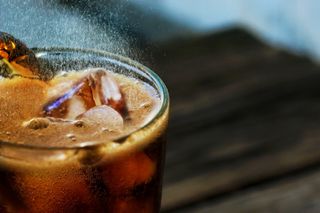Health
Could there be a link Between your teen's mental Health and soda?
A new study reveals the harm that teens may incur from frequently drinking soda.
Updated November 21, 2023

In the last few years, there has been an increase in awareness about the potentially harmful effects of soft drinks or carbonated drinks.
However, not much was known so far about their specific impact on teen mental health. A new study of about 8,000 Asian adolescents has shown that teens with frequent soft drink consumption scored significantly higher on depressive and anxiety symptoms.1
These findings have significant public health relevance, given the millions of adolescents who consume soft drinks on a frequent and even daily basis. The increase in anxiety and depression scores was found to be significant when the frequency of soft drink consumption was 7 or more times a week. This study also examined the sugar intake in soft drinks: adolescents with frequent intake of sugary soft drinks (>25 g/day) scored higher on anxiety and health screening measures.
Soft drinks typically contain carbonated water and sugar. While studies examining the link between sugar consumption and depression have been done, there is a scarcity of studies analyzing the association between soft drinks/carbonated drinks and various mental health problems.
Likely due to public health efforts and increased awareness, adolescent soda consumption has been found to be on the decline in recent years.2 According to findings from National Youth Risk Behavior Surveys, daily soda use among US high schoolers was 33.8% in 2007. This number fell to 20.4% in 2015.2
While there has been a decline in soda consumption among adolescents, the numbers are still high and given the high prevalence of anxiety and depression among adolescents, there is a strong need for further studies in this direction.
The participants in this study were university students in China. The measures utilized to screen for anxiety and depressive symptoms were the Generalized Anxiety Disorder questionnaire (GAD-2) and Patient Health Questionnaire (PHQ-2). The study did not find obesity to be a clinically significant mediating factor in this link.
One of the key strengths of this study is the large sample size. A limiting factor is that the cross-sectional design does not show soda consumption causes depression and anxiety in adolescents—only that there is a correlation between soda consumption and depression and anxiety in this group. Also worth noting is that this study focused on Asian adolescents. Further research examining this important topic among adolescents of various ethnic groups is needed.
Previously, a 2015 study of about 3,000 adults in China had concluded that soft drink intake is linked with increased risk of depression.3
In sum, caution needs to be exercised by parents and teens in regards to consumption of soft drinks or carbonated drinks. Preventative and educational efforts can go a long way in reducing any potential adverse effects of frequent consumption of such beverages.
References
1. Zhang X, Huang X, Xiao Y et al. Daily intake of soft drinks is associated with symptoms of anxiety and depression in Chinese adolescents. Public Health Nutr. 2019 May 17:1-8. doi: 10.1017/S1368980019001009. [Epub ahead of print]
2. Miller G, Merlo C, Demissie Z, Sliwa S, Park S. Trends in Beverage Consumption Among High School Students — United States, 2007–2015. MMWR Morb Mortal Wkly Rep 2017;66:112–116. DOI: http://dx.doi.org/10.15585/mmwr.mm6604a5
3. Yuac B, Head H, Zhang Q. Soft drink consumption is associated with depressive symptoms among adults in China. Journal of Affective Disorders. Volume 172, 1 February 2015, Pages 422-427


